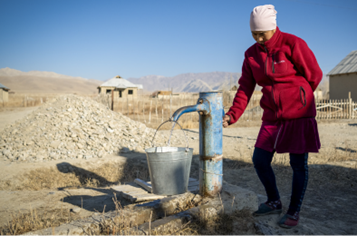What happened after winning the European Microfinance Award? How Kashf Foundation’s education pro...
- Mar 26, 2018
- 3 min read

Kashf was established in 1996 to provide microcredit facilities and other financial and non-financial services to poor households. It targets mostly women and aims at enhancing their incomes, savings, food security, and improving access to health and education. Kashf offers a range of products and services including microcredit, micro-insurance (health and life insurance), savings, financial education, business development services, and social advocacy interventions aiming at creating awareness about gender discrimination and social issues at the community level.
Kashf’s outstanding achievement, however, is in the field of increasing access to education for children. Education in Pakistan faces immense challenges. With an average of 37 students per teacher, 18% of teachers absent every day, unsafe school environments, 58% of state schools without toilets, 64% without access to water, and 46% of Grade 5 students not able to read, it is evident that there is an endemic quality issue in Pakistani public education, mainly due to insufficient government investment in the sector.
Kashf’s winning initiative was “Kashf School Sarmaya” or Kashf Education Finance Program (KEFP), a holistic credit facility providing access to finance to LCPS as well as capacity building and pedagogy training for teachers and school owners, and Training of Trainers on Financial Education for Youth. With this program, Kashf aims to support LCPS by helping them improve school infrastructure, teaching methods and school management skills. More information on the pedagogy and school owner training can be found on the 2016 Award page of e-MFP’s website.
What’s happened since Kashf won the 2016 Award?

Beyond the increase in programme outreach made possible by the Award prize, in order to better map the baseline data of the clients, Kashf revised its business appraisal forms for the program in 2017 to better gauge school clients’ profiles prior to disbursement. The two-page document assessment process of a school is now conducted more comprehensively, with data collected digitally via tablets. A revised process adds information on myriad other factors, such as grade level student enrolment and attendance, grade level fee acquisition, and lists of schools’ asset and quality and comprehensive details of loan utilisation.
After the revision of the business appraisal process, Kashf Foundation has also conducted Training of Trainers of its existing field-based operational staff, the Business Development Officers (BDOs) responsible for loan mobilisation and disbursement. 1,210 BDOs received this training in 2017.
KEFP has also addressed a significant challenge related to the supply of quality teachers faced by the sector through the provision of capacity building sessions for schoolteachers and school management. With on-the-ground experience of providing systemised financial education trainings to women entrepreneurs, Kashf had the model and expertise to conduct such trainings. To build on this, Kashf developed the Financial Education for Youth program with the goal of teaching basic financial and numeracy skills to students.
Kashf Foundation has also developed an in-house monitoring tool called the Quality Monitoring Framework (QMF) to gather information on indicators related to school quality and progress in order to effectively map the impact of the interventions. Impact assessment results from the latest QMF conducted in 2017 show an increase in 68% of profits for around 77% of the schools, which has led to improved infrastructure, resource materials, healthcare facilities, teaching quality and school management. 34% of the school loans have been used for infrastructural improvements, 33% for furniture, 12% for stationery and resource material provision and around 8% for acquiring computer systems for students and the school administration.
With respect to the indicators on education access, 71% of schools have observed an increase in their enrolment of around 28 students on average. On the quality side, 15% of schools have upgraded their first-aid facilities; 23% have developed libraries, which provide a more conducive environment for students to read and learn. Around 20% of schools have also understood the importance of better organising their classroom sessions and responded with the introduction of lesson plans and timetables.
Kashf Foundation was an outstanding candidate for the 2016 European Microfinance Award. The evaluation teams were struck by the innovation and vision in Kashf’s program, and everyone at e-MFP was proud to be able to highlight their achievements as they went on to win the Award. We are thrilled too to be able to see the concrete improvements that have taken place in the last year, a clear result of the Award prize being productively invested, and the access to global expertise and support that Kashf has been offered on the back of its profile as a European Microfinance Award winner.
We look forward to providing another follow-up down the track.
For more information on the 2016 Award, see also the European Microfinance Award website
author: e-MFP





Comments